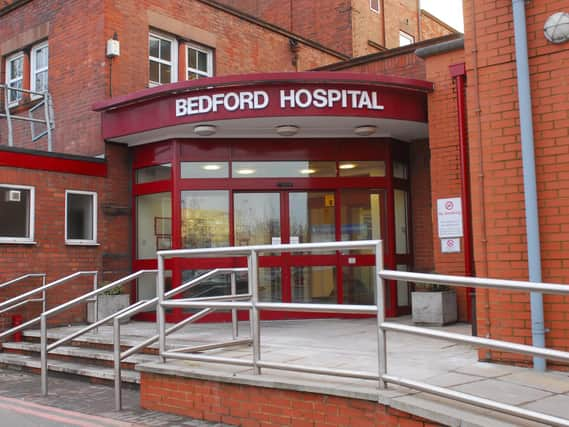Bedford Hospital's maternity services see new leadership team introduced in a bid to rectify failings


Much of the improvements centre around staff concerns and issues, rather than patient outcomes, a meeting of Central Bedfordshire Council’s social care, health and housing overview and scrutiny committee heard.
Maternity services at the hospital were downgraded to ‘inadequate’ after inspectors found a “potential risk for baby abduction”.
Advertisement
Hide AdAdvertisement
Hide AdThe Care Quality Commission (CQC) inspected Bedford Hospital’s maternity services in November because of 14 whistleblower enquiries between August and its visit. Inspectors observed “staff, women and visitors” leaving maternity wards “without challenge”, according to the CQC.
The unannounced inspection followed staff concerns about the safety of the service which “could lead to risk of harm to patients”, its report said.
Maternity services at the hospital were previously rated as ‘requires improvement’ after an inspection in August 2018 and one three years earlier.
The committee requested an update from the Bedfordshire Hospitals NHS Foundation Trust over the Cygnet ward at Bedford Hospital.
Advertisement
Hide AdAdvertisement
Hide AdThe maternity service at Bedford has had its challenges over the years, chief executive of Bedfordshire Hospitals NHS Foundation Trust David Carter told councillors.
“Regarding the CQC reports in 2015 and 2018, following concerns raised by staff, not patients, there was a visit from the CQC in November,” he said.
“Covid hasn’t helped. There were midwives shielding from Covid and some on maternity leave, and with that against a national shortage of midwives. The unit at Bedford is smaller than at the Luton and Dunstable, and one of the challenges of that is you have quite significant fluctuations in demand. There are an average seven babies born on any given day, but on the highest there’ll be 15 and on the lowest only one.
“That was the backdrop to the review,” he explained.
“We were required to do an action plan for the CQC following its visit. This included providing a more robust escalation process up the tiers of management at the times when it’s more challenging. You can respond to that by drawing staff from other areas. We put in increased medical consultant hours on the delivery suite.
Advertisement
Hide AdAdvertisement
Hide Ad“The most significant part to focus on is a proper organisational development plan to tackle staff welfare. If staff have a concern they can raise issues within the organisation and feel secure and safe to do that rather than going outside.
“The outcomes at the unit remain good,” added Mr Carter. “It’s the third lowest in its peer group of 39 for stillbirth and perinatal mortality.
“We’ve had really positive feedback from our patients, but we’ve got a significant piece of work to do. We’ve also changed the leadership team, so we’ve got a new clinical director across both sites. It’s a new management team which allows us to take a fresh approach.
“We had a meeting last week with the CQC, which is happy with our progress and the steps we’re taking. We can’t expect the unit to be in a better place overnight, but I’m very confident about the progress we’re making.”
If the current improvements are a success, a written statement from the trust to update the committee will be acceptable, councillors agreed.